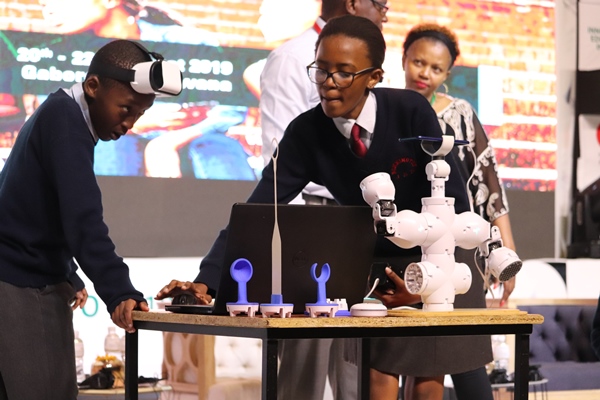Background
The advent of COVID-19 has exacerbated challenges in Africa’s education and training systems, and reinforces the need for innovative solutions that are fit for context, and can be scaled up sustainably to meet the continually evolving context of education and training. Although the education deficit in Africa is large, significant progress has been made over the past decade. About a fifth of children between the ages of 6-11 are out of school, whereas for children between 12-14, exclusion is about 33%; and an estimated 60% of youth between the ages of 15-17 not in school, with girls more negatively affected. Thus, access remains a challenge at different levels.
Innovating Education in Africa (IEA) was established in 2018 by the African Union (AU) with the aim of identifying, promoting and supporting the systemic adoption and replication of education innovations in all aspects of education and training in Africa. The event showcased 50 education innovations selected from across Africa and held policy dialogues with policy makers and development stakeholders to make the case for embedding innovation in education systems in Africa, and endorsing the implementation of the continental programme. In 2019 the event was held on a much larger scale with strengthening of partnerships with key education development organisations across Africa, such as EU, GIZ, ADEA, Mastercard Foundation, ONE, GeSCI, UNICEF and Ashoka. In 2020, Innovating Education in Africa was held as a series of virtual activities due to the COVID-19 pandemic with more than 300 submissions received from 31 African countries. Since the inception of the program, over 1,500 education stakeholders have been engaged, 140 innovations have been promoted, and 24 organisations implementing innovations have been supported with grants of 423,000 USD.
Objectives
The overall objective of IEA is to generate visibility and strengthen advocacy around education innovations in Africa, which have the potential to improve education delivery and enhance quality learning outcomes. Specifically, the programme will seek to achieve the following objectives.
- Identify, profile and showcase innovative education solutions from across the continent for possible support including further development and replication.
- Provide a platform for education practitioners, policy makers, business sector and partners to exchange experiences, policies and challenges in enhancing education and learning outcomes through education innovation in Africa.
- Promote collaboration among public sector and private sector to scale education innovations.
- Strengthen the capacity of Member States and Education Innovators through knowledge generation in implementing of in sustainable integration of education innovations in existing systems.
Main activities
IEA is implemented through a series of annual activities events including:
|
|
Activity |
Description |
|
1 |
Call for Innovations and Selection process |
The Call will be open to organisations from across Africa that are implementing innovations with proven results. Selection process will involve experts from AU and partner organisations. |
|
2 |
Advocacy and Events |
Stakeholders will be able to interact virtually with 50 longlisted innovations and the organisations implementing them. |
|
The webinar will bring together key experts in the continental education development ecosystem to discuss the trends and challenges and way forward for adopting education innovations. |
||
|
The event will provide an opportunity for 10 shortlisted organisations to justify the potential of their innovation before an expert jury. The jury will select 3 finalists to receive up to USD 100,000 in grants. |
||
|
3 |
Pilot projects of the outstanding Innovations and Knowledge Generation |
Three (3) selected innovations will be implemented through pilot projects in AU Member States where they are based. |
|
4 |
Knowledge Generation |
Conduct an action research to identify the opportunities to scale the models of the innovations in AU Member State contexts, using evidence from pilot exercises. |

